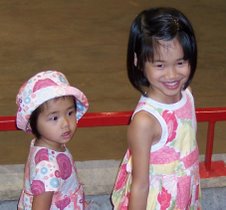Not really – I don’t know enough to tell folks how to move to China. But I’ve gotten lots of comments and email questions asking me how I did it because the writer is interested in doing it, too. Most are the parents of Chinese adoptees, some are lawyers, and some are teachers. My experience may not be typical, but I thought I’d try to explain a little about why and how I did it, and give what few suggestions I have.
But first I have to explain that I’m a wimp about discomfort. Yes, I love to travel and loved my three short trips to China. But I like air conditioning, room service, ice in my drinks, Western toilets, and being able to read street signs. I knew I’d be giving all that up when moving to China. In fact, I remember when I first visited China in 1991 that I had never felt more FOREIGN and incompetent in my life. Living abroad was definitely on my mind then, since I was visiting my old college roommate in Singapore on that trip as well. I thought, I would NEVER live in China – though Hong Kong struck me as doable as an expat.
Still, as much as I love a Route 44 cherry limeade from Sonic, with all that crushed ice (ahhhhh!), I love my children more. They are really the reason I’m here. And I know that’s what is motivating all those adoptive parents who are thinking about leaving their comfort zone to live in China. But I’m not claiming martyrdom, sacrificing all for my children. I’m having an absolute BLAST here! And 5 months isn't exactly living in China -- it's more like an extended vacation. But having a job and an apartment and kids in school makes it feel like living in China!
The idea of living in China for a time started to seem like a good idea in December 2004. Zoe had just turned 4, and seemed to have something of a racial identity crisis starting. We were in the checkout line at Target when she suddenly said, “I wish my skin was light.” Wow, way too young for that, I thought. Later that month she refused to see an African-American Santa at a store. I thought it was Santa fear, but later that day she told me out of the blue, “I don’t want to see a Santa who has skin like mine.” When she got a Mulan doll for Christmas she excitedly exclaimed, “Look, she has black hair like mine!” But then she said dismissively, “But her skin is light.” Oooooookay! Houston, we have a problem. How are we going to deal with this?
The first thing I did was sign Zoe up for Chinese School on Saturday afternoons. I wanted her to interact with more adult Chinese, and I wanted her to know Chinese kids who were NOT adopted (for a while there I think she believed that being Chinese and being adopted were synonymous!) I wanted her to experience a world where she was in the majority, not the minority. And Chinese School was a huge success – she loved it!
About that time I got a blast email to faculty from a colleague, a former Fulbrighter, saying that the deadline for applying for a Fulbright grant to teach in China had been extended. Hmmmm. [You can read all about the Fulbright program by clicking on the link to the right of this blog.]
I started thinking about the logistics of such a plan – could I take leave from work? How could I afford it? What would I do with my house? How would this work when I had a second adoption in the works, and would be heading to China, as a single parent, with TWO children? I decided I’d figure out the answers to those questions IF I got the grant, so I started filling out the application. I think I was half-hoping I wouldn’t be selected. And since I needed three references, I had to tell some folks that I was applying. And they all treated me like I had lost my mind! How would I, a single parent of two, manage in China?!
In the meantime, we came to China in March 2005 for Maya’s adoption. Zoe was a great traveler, making a long sojourn in China seem less insane than it sounded. And Maya adjusted beautifully to all the changes in her life, showing herself to have the same flexible personality as big sister. Maybe I wasn’t so crazy after all . . . .
Well, I did get the award, and started making plans to go to China in February 2006 (yes, 2006!).
Plans were going swimmingly. I made arrangements at work to be on leave, the Fulbright grant was generous enough for me to afford two households – one in the U.S. and one in China (you still have to pay the mortgage even if you’re not living there!). I planned simply to close up the house and have my parents check on it periodically.
You know that expression, "Life is what happens when you're making other plans"? I went to the doctor on Dec. 19, 2005, with a persistent cough, and a chest x-ray showed pulmonary nodules that looked like metastatic cancer (meaning it looked like cancer from somewhere else that had moved to my lungs, not like primary lung cancer). So off we went on a search for the primary site of the alleged cancer. I was CT-scanned, PAP-ed, mammo-ed, ultrasounded, needle biopsied, PET-scanned, surgical-biopsied . . . . and no cancer! But it took three months to find that out. And somehow the Fulbright people thought maybe it wasn’t wise to head to China in the midst of all that: “Umm. So you want to go to China, even though the pulmonary nodules might be cancer, and you'll just need a CT scan there in 3 months, and if they've grown, you'll need a biopsy of your lungs, and if it's cancer, you'll need to come home in the middle of the grant period? We don't think so!” But the Fulbright folks really were terrific – arranging to extend my grant to this academic year without my having to reapply.
And the one-year delay was really a blessing. Maya’s being older and fully potty-trained has made it SOOO much easier this year than it would have been last. And I think being home for two years instead of just one before returning to China has been best for her, too. Zoe is also older and more mature, and had one more year of Chinese School under her belt. And I am far healthier – though I didn’t have cancer, I did have bronchitis and a sinus infection that took 5 rounds of antibiotics to kill. And my new pulminologist discovered that I had sleep apnea – no wonder I was exhausted, I was waking up at night 30 times AN HOUR! Now that that is being treated, I’m a new woman. Plus, this year my nephew and his girlfriend were able to come down from Vermont and live in my house, which is good for my house and good for my parents to have relatives close by now that I’m out of the country.
So that’s how I did it, easy as pie. Being qualified for the Fulbright grant really made it extremely easy, because it is a well-run, well-organized group that brings at least 25 scholars to China a year (as well as thousands to other countries, too). There are several different Fulbright programs, so you don’t necessarily have to be a University professor to apply. I know they have a program for primary and secondary school teachers and administrators and other professionals.
A lot of people come to China to teach English. For most of those teaching positions there is no requirement that you have an education degree or any experience teaching – they just want native speakers of English. Do an internet search for “teaching English in China” and you’ll find tons of information and organizations (check carefully, I’m not sure which organizations are reliable and which ones aren’t, but it’s a place to start). I know a single mom who came to China with her two kids to teach English and stayed for several years. The nice thing about coming to China with an organized group like Fulbright is that they will help with a work visa and finding housing.
Money is the biggest factor for most people in deciding whether to live and work in China. It certainly was for me. For most positions, like teaching English, the pay is ridiculously low – a monthly salary of 6,000 RMB (about $800 a month) is considered extremely generous for such a position). But it is REMARKABLY cheap to live here – our monthly expenses (which do not include rent and utilities, but do include frequently eating out and lots of shopping, and tuition for Zoe and Maya at school) have been about $350. So, if you’re not carrying a lot of debt at home, you can live comfortably in China on the salary you’d get as an English teacher.
And more and more U.S. companies are doing business in China. Check out some companies in the U.S. with branch offices in China, and take the plunge! The water is nice and warm!
As you can see, I’m no expert, as I warned you. But I will say that coming to China is the best decision I’ve made since the decision to adopt my girls. I see this as a practice run for a longer stay when they are older – I can apply for another Fulbright grant, this one for a full year, in 5 years! And who knows, this might be a great cheap place to retire – I’m pretty sure the girls would come to visit me here!
Subscribe to:
Post Comments (Atom)







6 comments:
What wonderful information! I've been curious, like many. Wish I could, but we're a family of 5, and hubby has to stay here to work. :( I have a friend that is quite interested though, I'll share your info.
Christine
Sophia's Website
Great info! Thank you for sharing.
Thank you so much for all the great insight - what about animals - can you take them? We have 2 cats - that yes - are part of the family as well..silly ole me...
Thanks for sharing -- we are trying to decide between Xiamen and Singapore posts. We will get to visit the two cities, but I still think it will be a hard decision!
Hi
I have a question -my partner and I have 2 boys 4 and 1 and have been asked to go to Shanghi for 2 years+ I am uncertain about teh experience as I dont want to be a classic expat in an enclave but also need my oldest one to go to school and be able to settle in when we return. We are Greek/ozies so there is no chinese connection to start us with - what advice do you have on housing etc?
Marki,
I don't know if I can really help you, but I'd strongly advise doing what you can to have your children in Chinese schools rather than international schools. That's the best way to avoid expat-enclave fever I think. My kids have been my best entree into relationships with Chinese people, far more than have developed at work. Will both of you be working outside the home? If not, perhaps you could homeschool in what your son needs to stay up with his peers and still have him go to Chinese school. Good luck!
Post a Comment